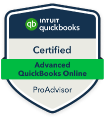
When you’re a sole proprietor but not an accounting wiz, bookkeeping can be overwhelming.
Bookkeeping is an essential task for sole proprietors that helps you keep track of your financial health, meet tax obligations, and make informed business decisions. Even if you’re not a pro, following key practices can simplify the process and keep your business finances on track. Here are some helpful bookkeeping tips for sole proprietors from our experts.
1. Separate Personal and Business Finances
One of the most important steps for any sole proprietor is to separate personal and business finances. Sole proprietors should open a dedicated business account exclusively for all business transactions. Separating personal and business expenses simplifies bookkeeping and protects you in the event of an audit. It also ensures that all business-related income and expenses are documented, making tracking your financial performance easier.
2. Track Income and Expenses Diligently
Consistent and accurate tracking of income and expenses is the cornerstone of effective bookkeeping. It takes time, but make it a habit to record every financial transaction as soon as it happens. Whether it’s a sale, a purchase, or a payment to a supplier, keeping detailed records of all income and expenses will help you maintain a clear picture of your financial health. Accounting software like QuickBooks or FreshBooks can streamline this process and ensure all transactions are correctly categorized.
3. Maintain Detailed Records
Maintaining detailed records is critical for effective bookkeeping. This includes saving receipts, invoices, bank statements, and any other documents related to your business transactions. These records are essential for preparing accurate financial statements and tax returns. Additionally, well-organized records can save you time and stress during tax season and provide valuable insights into your business’s financial trends.
4. Use a Cloud-Based Accounting Software
Cloud-based accounting has become the standard for small to medium-sized businesses for its automation and streamlined processes. Most business owners use QuickBooks Online or FreshBooks as both of these software are user-friendly with simple interfaces.
Cloud accounting:
- Allows you to access your books from anywhere in the world with an Internet connection.
- Keeps information private with robust cybersecurity features.
- Automatically backs up your data into the ‘cloud.’
- Integrates with third-party apps like Shopify, WooCommerce, Dext Prepare, Expensify, and more for a streamlined process.
5. Regularly Reconcile Bank Statements
Reconciling your bank statements is crucial in ensuring that your bookkeeping is accurate. This process involves comparing your bank statements with your records to ensure all transactions are recorded correctly. Regular reconciliation helps you catch errors, identify discrepancies, and ensure that your financial records are up-to-date.
Set aside time at the end of each week to review your books and commit to the time you schedule. You’ll need to pay close attention to all transactions that happen in your business and perform reconciliations to verify that all of your records are accurate. Completing weekly and quarterly reviews will help you stay on top of your books and give you peace of mind that your finances are under control.
Bookkeeping is so much more than data entry and dealing with receipts, invoices, and statements. Bookkeeping is a window into your business’s financial health and the most essential tool for growth.
6. Take advantage of bookkeeping training sessions
All of your accounting functions rely on the organization and accuracy of your books, making bookkeeping one of the most critical areas of your business. Inaccurate records can result in large tax penalties and time-consuming errors. However, the reality is that most business owners are not trained accounting professionals. An innocent entry that seemingly follows the rules can create a big headache in the future.
A bookkeeping training session with an accounting professional can help you gain the confidence you need to maintain tight records and organized books. With a live training session, you’ll learn how to customize your accounting software, have all your questions answered, save time, learn tips and tricks to get the most out of your software, and more.
For something so crucial to your business’s success, it’s worth investing in bookkeeping training sessions with an experienced accounting professional. The knowledge and valuable insights you gain can help you save time and avoid a potentially stressful situation.
7. Set Aside Money for Taxes
Sole proprietors are required to pay taxes on business income, including self-employment taxes. It’s wise to set aside a portion of your income for taxes throughout the year to avoid being caught off guard when tax time comes around. A good rule of thumb is to reserve about 25-30% of your income for taxes, which will help ensure you have enough funds to cover your tax obligations without scrambling at the last minute or paying high penalties and interest rates.
Consider Professional Help If Necessary
While many sole proprietors try to manage their bookkeeping on their own, there may come a time when professional help is needed. If your business is growing, your bookkeeping becomes more complex, or you simply don’t have the time to keep up with it, hiring a professional bookkeeper or accountant can be a wise investment. They can provide expert advice, help you comply with tax laws, and ensure that your books are accurate and up-to-date.
Bookkeeping Training from Accounting by Sal
Accurate bookkeeping is essential for the success of any sole proprietorship. By separating personal and business finances, diligently tracking income and expenses, maintaining detailed records, regularly reconciling bank statements, setting aside money for taxes, and accessing professional training can help you manage your finances efficiently and keep your business on a solid financial footing. With these tips in mind, you’ll be better equipped to handle your bookkeeping tasks and focus on what you do best—growing your business.
At Accounting by Sal, we understand the unique challenges sole proprietors face. Our comprehensive services, including done-for-you bookkeeping, DIY bookkeeping training, and business mentorship, are designed to help you manage your finances confidently.
Whether you’re just starting and need bookkeeping tips for sole proprietors or looking to refine your bookkeeping skills with our bookkeeping training, our expert team is here to support you every step of the way. Contact us to learn how we can help you achieve clarity and peace of mind in your financial management.














